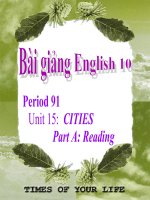Bài giảng Tiếng Anh 10 - Unit 15: Cities (Reading)
Bạn đang xem bản rút gọn của tài liệu. Xem và tải ngay bản đầy đủ của tài liệu tại đây (1.82 MB, 22 trang )
PARIS
Eiffel Tower
SYDNEY
The Open Opera Theatre
NEW YORK
The Statue Of Liberty
Unit 15
CITIES
I. BEFORE YOU READ
• Work in pairs. Look at the following pictures of well
– known places in New York. Match the names to
the pictures.
A. The Empire State Building
B. The United Nations Headquarters
C. Times Square
D. Central Park
g
1
2
3
4
Unit 15
CITIES
I. BEFORE YOU READ
Read the passage and underline new words while
reading
• New York City is located in the southeastern part of New York State. It developed at the
point where the Hudson and Passaic rivers mingle with the water of the Atlantic Ocean.
New York Harbour, which is icefree in all seasons, is one of the largest and finest in the
world.
• With a population of more than 7 million in the city and 19 million in the whole
metropolitan region, and the total area of 946 square km, New York is the largest city in
the United States.
• The city was founded by the Dutch in 1624. At first, it was called Fort Amsterdam, and
then New Amsterdam. In 1664, the English took over the city and renamed it New York.
New York is a very unusual city. Although it is not the capital of the country, it is the
home of the United Nations and the centre of global finance, communications, and
business.
• New Yorkers are people who come from all over the United States and many different
countries in the world. The city is characterised by its hundreds of tall offices and
apartment buildings, some of which are among the tallest buildings in the world.
• Visitors to New York are all attracted by places such as the Statue of Liberty, the Empire
State Building, Wall Street, and the Broadway Theatre district. New York is also the
place where tourists can visit some world famous art galleries and museums.
New Words:
Located (adj) /ləu'keitid/ : ở vị trí
Mingle with /'miηgl/ : hòa lẫn, trộn lẫn
Icefree (adj) /‘ais fri:/ : không bị đóng băng
Metropolitan (adj) :
(thuộc về)
/,metrə'pɔlitən/ :
khu đô thị lớn
Found (v) /faund/ : thành lập
Take over /'teik'ouvə/ : nắm quyền kiểm soát
Unusual (adj) /ʌn'ju:ʒl/ : kì lạ, đặc biệt
Finance (n) /'fainæns/ : tài chính
Communication (n)/kə,mju:ni'kei∫n/
truyền thông
Characterise (v) /'kæriktəraiz/ : đặc trưng hóa
Art gallery (np) /ɑ:t 'gæləri/ : triển lãm nghệ thuật
Unit 15
CITIES
II. WHILE YOU READ
Task 1: Matching
A
1. Metropolitan region
B
a. Not covered with ice
2. Take over
b. Mix with
3. Unusual
c. Get control of
4. Icefree
d. City and large area around
it
e. Special
5. Mingle with
Unit 15
CITIES
II. WHILE YOU READ
Task 2: True or False Statements
1 New York is the name of both a state and a city.
T F
2 New York Harbour has a lot of ice in winter.
3 New York is on two rivers.
4 The United nations Building is in New York.
5 New York belonged to the Dutch when it was founded.
Unit 15
CITIES
II. WHILE YOU READ
Task 3: Answer the questions.
WHAT
HOW
WHICH
WHY
WHERE
NEXT
Question 1
Where is New York city?
It is located in the southeastern part of
New York State.
Question 2
How much population is there in New York
city?
It has a population of more than 26 million
(7 million in the city and 19 million in the
metropolitan region).
Question 3
Why was New York originally called
New Amsterdam?
Because the city was founded by the
Dutch.
Question 4
What makes New York an unusual city?
New York is the home of the United Nations,
the centre of global finance, communications
and business.
Question 5
Which places in New York are visitors
attracted to?
They are attracted to the Statue of Liberty,
the Empire State Building and the Broadway
theatre district.
Unit 15
CITIES
II. AFTER YOU READ
Choose the best answer to complete these sentences
1. New York is the of .
A. capital/ the USA B. home/ the United Nations
C. state/ the USA D. B and C are correct
2. The city was founded by the .
A. The Dutch B. the French C. the American D. the Asian
3. New York is on two rivers: _______ and ________ rivers.
A. Nile and Amazon rivers B. Mississipi and Mekong rivers
C. Hudson and Passaic rivers D. Nile and Mekong rivers
4. It is famous for .
A its interesting places. B. its largest and finest harbour
C. Its high buildings, art galleries and museums.
D. A,B and C are correct
Central Park
The Empire State
Building
The United Nations
Headquarters
Times Square
Wall street
the Statue of Liberty
Homework:
Learn by heart
new words.
Prepare for the
next lesson:
Speaking
Goodbye and see you
again in New York






